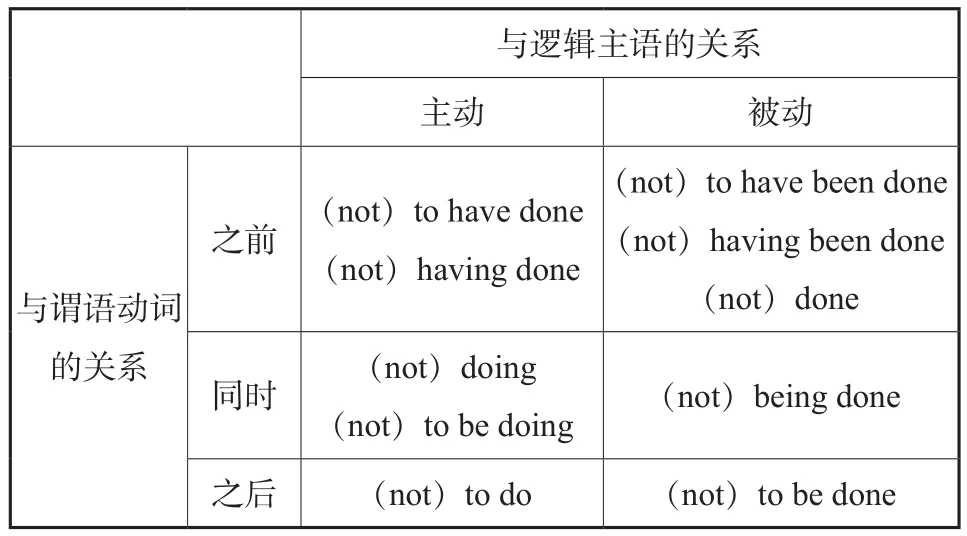把握两组关系 记住八个要点
——非谓语动词学习难点突破与高考备考要诀
新疆 单 妙 常玉国 (特级教师)
把握两组关系 记住八个要点
——非谓语动词学习难点突破与高考备考要诀
新疆 单 妙 常玉国 (特级教师)
非谓语动词多年来一直是高考的难点和热点。从近几年高考来看,非谓语动词的考查多出现在语法填空和短文改错中,但是在写作、完形填空及阅读理解中也是不可或缺的主要语法现象。
对于非谓语动词的考查主要集中在以下4个方面:1.考查对谓语动词与非谓语动词的识别,要求明确句子的结构和意义,掌握非谓语动词的基本用法。2.考查不定式和动名词作宾语的区别,要求掌握一些常见动词后面接宾语的形式。3.考查非谓语动词作定语、状语、补语时的区别,尤其是不定式、现在分词短语、过去分词短语所表示的不同时间、逻辑关系和意义。现在分词和不定式作结果状语时的区别应引起足够重视。4.考查非谓语动词的否定式、完成式、被动式及复合结构,要求掌握其构成形式、所表示的时间以及逻辑关系。而其中的难点则有两点:一是非谓语动词形式的确定,二是需要准确记忆的要点。
本文从非谓语动词的两组关系和八个要点入手,帮助同学们理清非谓语动词学习与应用的难点,对同学们的解题会有所帮助。
把握两组关系,确定非谓语动词时态语态
非谓语动词因为具有动词的特征,自然也就有了时态和语态的用法。其时态有一般时、进行时和完成时;而语态则是主动和被动。非谓语动词时态和语态的确定主要看两组关系:一看非谓语动词和句中谓语动词的关系,确定非谓语动词的时态;二看非谓语动词和逻辑主语的关系,确定非谓语动词的语态。可以说这两组关系可以为80%以上的非谓语动词题目提供解题思路。
两组关系及具体用法见下表:

___________与逻辑主语的关系________________________主动 ________被动与谓语动词____________________________的关系之前 (not)to have done(not)having done(not)to have been done(not)having been done(not)done_____同时 (not)doing ______(not)to be doing ____________________(not)being done _之后 ___(not)to do __(not)to be done
【高考链接】(2015·全国新课标卷Ⅱ,语法填空,61)The adobe dwellings(土坯房)_____(build)by the Pueblo Indians of the American Southwest are admired by even _62_the most modern of architects and engineers.
【解析】built。空后所给动词“build”和其逻辑主语“The adobe dwellings”之间是动宾关系,故用其过去分词built作后置定语,相当于一个定语从句。
【高考链接】(2015·天津卷,单选改编,8)_____(work)for two days,Steve managed to finish his report on schedule.
【解析】Having worked。句意:工作了两天,Steve成功地按时完成了他的报告。句中的逻辑主语“Steve”与所给动词“work”之间为主动关系,故用现在分词,这里用Having worked,表示此动作发生在谓语动词动作之前。
【高考链接】(2015·陕西卷,单选改编,18)Back from his two-year medical service in Africa,Dr.Lee was very happy to see his mother______(take)good care of at home.
【解析】taken。句意:在非洲医疗援助两年回来后,Dr.Lee很高兴看见妈妈被照顾得很好。“his mother”和“take care of ”之间是被动关系,用过去分词作宾语补足语。
记住八个要点,确定非谓语动词具体形式
要点一:在megidcarfeps(谐音:卖给的咖啡不是)及介词后只能跟doing的适当形式作宾语。
megidcarfeps是一个杜撰的单词,取自若干个单词的首字母,用来帮助我们记忆常常后跟动名词作宾语的高考常考动词。分别对应如下:m—mind(介意)/ miss(错过),e—enjoy,g—give up,i—imagine(想象),d—delay(推迟、延误)/deny(否认),c—consider(考虑)/can’t help(情不自禁),a—avoid(避免)/admit(承认,认可)/ appreciate(欣赏,感激),r—risk(冒……险)/resist(抵制,抵抗),f—finish,e—escape(逃避),p—practise/ prevent,s—suggest(建议)。
【高考链接】(2015·全国新课标卷Ⅱ,完形填空改编,49)As a parent,I avoided______(see)my daughter playing her best,but still defeated.
【解析】seeing。avoid后只能跟v.-ing作宾语。
【高考链接】(2015·全国新课标卷Ⅰ,完形填空改编,47)Then my 17-year-old suggested_____(give)him a gift card.
【解析】giving。suggest后跟v.-ing作宾语。句意:我17岁的儿子建议我给他一个礼物卡。
【高考链接】(2013·全国大纲卷,短文改错)He isn’t good at talk but he gets on well with other people.
【解析】talk改为talking。介词后须跟动词-ing形式。
要点二:在R,wolf head map!(啊,狼头图!)后只能跟动词不定式的适当形式作宾语。
R,Wolf head map为以下单词的首字母组成:R—refuse,w—want/wait,o—offer,l—long(渴望),f—fail(失败),h—hope/happen(发生;碰巧),e—expect(期待;预期),a—ask/appear(显得),d—decide/determine(决心),m—manage(设法),a—agree/afford(负担得起),p—pretend/promise。
【高考链接】(2014·全国新课标卷Ⅱ,语法填空,66)I heard a passenger behind me shouting to the driver,but he refused______(stop)until we reached the next stop.
【解析】to stop。refuse后只能跟to do。
【高考链接】(2015·四川卷,短文改错)It’s been a month since I came to this new school and I really want share with you some of the problems I have been experiencing.
【解析】在want和share之间加to。考查动词want的用法,want to do,to不可省略。
要点三:在“两栖类”动词后既能跟doing又能跟to do作宾语,但意义有别:后跟不定式表示发生在谓语动词动作之后的动作或另一动作;后跟动名词则表示发生在谓语动词动作之前的动作或同一动作。
“两栖类”动词我们用frogs(青蛙,不就是两栖类动物吗?)来代表,再加上try和mean两个动词。frogs:f—forget,r—remember/regret,og—go on,s—stop。另外还须注意:try to do(尽最大努力去做),try doing(试一试),mean to do(打算做),mean doing(意味着)。
【高考链接】(2015·陕西卷,单选改编,17)After receiving the Oscar for Best Supporting Actress,Anne Benedict went on_____(thank)all the people who had helped in her career.
【解析】to thank。句意:在获得奥斯卡最佳女配角后,Anne Benedict继续感谢所有帮助她演艺生涯的人。go on to do意为“继续做不同的事情”。
【高考链接】(2012·安徽卷,单选改编,24)I remembered_____(lock)the door before I left the office,but forgot to turn off the lights.
【解析】to lock。考查非谓语动词。句意:我记得离开办公室前要把门锁了,但却忘记关灯了。remember后跟不定式表示“记得去做某事”。remember后还可跟v.-ing作宾语,表示“记得做过某事”。
要点四:在“听、看、观、感、使、让、帮”后跟动词不定式作宾语补足语时,动词不定式须省略to。这个结构一般是:“听、看、观、感、使、让、帮+sb.+do”。但在这些动词用作被动语态时须还原to。另外,其后动词不定式表示“此时(那时)正在进行的动作”时,要跟doing。
“听看观感使让帮”:听—listen to/hear,看—look at/see/notice/watch,观—observe,感—feel,使—make/ have,让—let,帮—help。
【高考链接】(2014·全国大纲卷,短文改错)Otherwise,it is impossible for them to help each other and to make their friendship to last long.
【解析】to last删掉to。make后接不定式作宾语补足语时,动词不定式要省略to。
【高考链接】(2011·广东卷,短文改错)I got on the bus and found a seat near the back,and then I noticed a man______(sit)at the front.
【解析】sitting。考查notice sb.doing sth.结构。此处sitting表示这一动作正在进行中。
要点五:表示心理活动的后跟doing和to do有区别的动词。
1.love,like,dislike,hate等,表示“经常性”的行为应该用doing;表示“特定的,某次具体的活动”时用to do。
【经典试题】Little Jim should love_____(take)to the theatre this evening.
【解析】to be taken。take与其逻辑主语“Little Jim”之间为动宾关系,又因为是一次“特定的、具体的”活动,故用to do。
2.be afraid to do“不敢,胆怯去做某事”,是主观上的原因不去做,意为“怕”; be afraid of doing “担心出现doing的状况、结果”,doing 是客观上造成的,意为“生怕,恐怕”。
【高考链接】(2014·福建卷,单选改编,34)Pick yourself up.Courage is doing what you’re afraid_____(do).
【解析】to do。be afraid to do意为“不敢,胆怯去做某事”。句意:振作起来,去做你不敢做的事情,就是勇气。
要点六:“前有do,后省to”的几个用法。
1.如句中含有实意动词do时,but,except,besides等词后面的to可省略。即“前有do,后省to”。如:
【经典例句】He didn’t do anything but complain.他除了抱怨,什么都不做。
2.表语前的内容如果有do的话,其后作表语的动词不定式常常省略to。
【经典例句】The only thing I could do was (to)go home.我能做的唯一的事情是回家。
要点七:want/need/require后跟动词时的两种用法。
1.sb.want/need/require sb.to do sth.和 sb.want/need/ require to do sth.。
【高考链接】(2015·天津卷,单选改编,12)We need______(get)to the root of the problem before we cansolve it.
【解析】to get。
2.sth.want/need/require doing “某事/某物需要被……”,主动形式表示被动意义的用法。
【经典例句】See,something has gone wrong with my bicycle.It wants repairing again.
要点八:含有非谓语动词的一些固定搭配。
1.短语类
(1)only to do 结果却……(常常表示出人意料的结果)
(2)generally speaking;to be honest;to tell the truth;judging by/from...
(3)can’t help doing忍不住,情不自禁做……;can’t help to do不能帮忙做……;can’t help but do不得不,只好
(4)序数词后常跟动词不定式作定语。例如:
He is always the first to come and the last to leave.
【高考链接】(2014·天津卷,单选改编,5)Anxiously,she took the dress out of the package and tried it on,only______(find)it didn’t fit.
【解析】to find。句意为:她急忙从包裹里拿出连衣裙来试穿,却发现并不合适。此处表示出人意料的结果,故用“only+不定式”结构。
【高考链接】(2011·四川卷,短文改错)He had time for a proper breakfast and was still the first reach the factory.
【解析】在first与reach之间加to。句意为:他有时间吃一顿悠闲的早餐,并且仍然是第一个到达工厂的。“the first”为序数词,后面常跟动词不定式作定语。
2.句型类
(1)There is/ I have/ find+difficulty/ some trouble/ problem/ fun/ pleasure/+(in)doing sth.做某事有困难/乐趣/欢乐
(2)There is no+harm/ hurry/ need/ use+(in)doing sth.做某事没有坏处/不着急/不必要/没有用处
(3)It takes (sb.)some time/ money/ energy to do sth.做某事需要花费某人时间/金钱/能量等(It用作形式主语,真正的主语为动词不定式to do sth.)
(4)It is difficult/ hard/ easy/ interesting...to do sth.做某事是困难的(容易的、有趣的……)
(5)when it comes to (doing sth.)至于说到(做什么)
(6)be worth doing(某事)值得做 (主动形式表示被动意义的用法)
(7)Why not do...?为什么不做……?(表示建议)
【高考链接】(2014·上海卷,单选改编,31)Apparently,I had difficulty_____(adapt)myself to life in the city,let alone finding a job to my delight.
【解析】adapting。句意为:很显然,我适应城市生活有困难,更不必说找到一份令我高兴的工作了。“have difficulty (in) doing sth.”做某事有困难。
【高考链接】(2014·全国新课标卷Ⅰ,语法填空,65)It took years of hard work_____(reduce)the industrial pollution and clean the water.
【解析】to reduce。It takes/took sb.some time to do sth.
意为“做某事需要花费某人时间”。故用动词不定式。
【高考链接】(2014·辽宁卷,短文改错)It is difficult to understanding why she barks every minute she is outside.
【解析】understanding改为understand。It is difficult to do sth.意为“做某事是困难的”,故将understanding改为understand。
【高考链接】(2007·辽宁卷,单选改编,34)You can’t imagine what difficulty we had_____(walk)home in the snowstorm.
【解析】walking。见上面句型(1):have difficulty (in)doing sth.。由于句子中in可以省略,所以该题目虽然将宾语前置,后面用了一个定语从句,但是结构不变,在某方面依然是in doing sth.,只是in被省略。
如此,我们在学习非谓语动词时,如果学会了用两组关系去思考,记住了这八个常考易错要点,非谓语动词将成为我们的得分点!
【巩固练习】
1.______(catch)in a heavy rain,the teacher fell ill and had to ask for a leave.
2.As I will be away for at least a year I’d appreciate_____(hear)from you now and then telling me how everyone is getting along.
3.Lost in the book she was reading,Lucy failed______(notice)him.
4.—You were brave enough to raise objections at the meeting∶
—Well,now I regret_____(do)that.
5.People from all the corners came to the city center,______(make)it very crowded.
6.Tom likes going to the movies,but he hates_____(go)now.
7.He survived the crash,only_____(die)in the desert.
8.They required him_____(keep)it a secret.
9.It takes Lucy much energy______(finish)the task.
【参考答案】1.Caught 2.hearing 3.to notice 4.doing/ having done 5.making 6.to go 7.to die 8.to keep 9.to finish
(作者单位:单 妙 新疆哈密石油高级中学;常玉国 新疆哈密地区第二中学)

